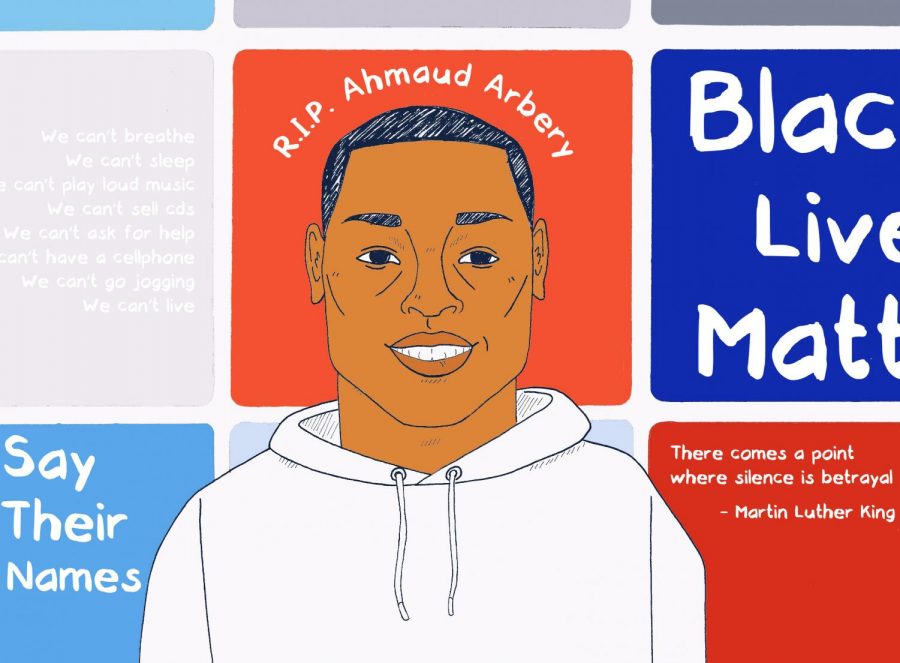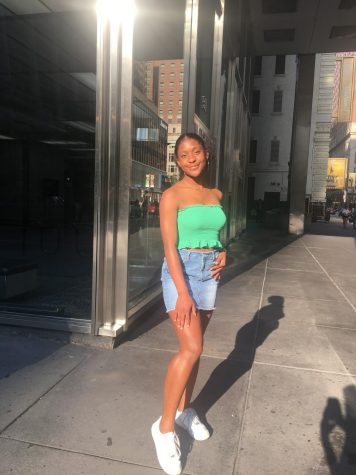It’s up to us to take action
Trigger Warning: this article contains content on the recent events regarding Ahmaud Arbery.
May 14, 2020
I opened up Instagram. The first thing to appear on my feed was a video posted by social media activist, Shaun King, deemed sensitive content. I felt a pit begin to build in my stomach. In the span of 36 seconds, many emotions washed over me. Disgust, pain and anguish to name a few. Another unarmed black man was killed, and it was readily accessible for all to see.
The tragic video displays 25-year-old Ahmaud Arbery jogging in Brunswick, Glynn County, Georgia. He encounters two men, Travis and Gregory McMichael, who had reportedly been chasing Arbery. There is a physical altercation, then three gunshots fire. Arbery takes a few steps, then collapses to the ground. End of video.
I immediately became worried for my own family. It could’ve been me, or my father, or my six-year-old brother in that position. It’s heartbreaking to me to know that some people will never look beyond a person’s physicality, ignoring everything else that makes up their personality. Then to believe that violence is justified upon physical appearance is utterly despicable.
Since that day, I’ve begun to challenge the notion that this sort of violence on the internet is normal. It’s not. Being able to witness the last few breaths of a man’s life felt insensitive and doesn’t acknowledge all the joy he may have felt in his life.
I discovered this not through an article, not through a news correspondent, but through social media. It speaks in part to the complexity of its effects.
In this specific instance, I think it can be viewed for multiple standpoints. On one hand, media outlets allow for black trauma to be normalized. For those who are black, it could be detrimental to their mental health to see violence inflicted upon those of their community circulated so often.
“Over the centuries the Black community has developed a cultural knowledge of these sorts of horrific events, which then primes us for traumatization when we hear about yet another act of violence,” says psychologist Monnica T. Williams in her article published in Psychology Today.
On the other hand, I wonder whether the same sort of action would’ve been taken without the presence of the video. This atrocity took place on February 23, 2020, yet it took 74 days for the McMichaels to be arrested.
The video surfaced on the internet Tuesday, May 5 and two days later, the Georgia Bureau of Investigation arrested the two men for Arbery’s death.
Even though prosecutor Tom Durden, of Georgia’s Atlantic Judicial Circuit claims that “We [circuit] don’t let that influence the decision,” I can’t help but feel that in some way, the public outcry in response to the video did in fact have some impact.
“Always remember, they didn’t make arrests because they saw the tape; They made arrests because we say the tape,” tweets comedian Keith Lowell Jensen.
As I am about to move into the world as an ETHS graduate, I am becoming more and more conscious of what the world around me looks like. To those who are about to embark on a brand new journey like myself, we must take action.
Calling out injustice isn’t just the responsibility of the people who are experiencing it. It is everyone’s responsibility to take care of one another.
We must speak openly and honestly about racism in all of the spaces we occupy. What I’ve learned through my work with Students Organized Against Racism is that we must become comfortable with discomfort. The change we want to see in the world must first be done within ourselves.
There is already an insurmountable amount of fear and worry being circulated around the country, and rightfully so. People are fighting for their lives to combat COVID-19, and bearing witness to rampant violence without reflecting on the lives lost is counterproductive to the change that we must make in this world.
What can we do to ensure this never happens again? That action is taken against injustice in the moment, and not in response to public outcry? For now, that answer is unknown. What is known, however, is that we are the key to the necessary change in order to defeat injustice.
And in the classic words of Dr. Martin Luther King, “Darkness cannot drive out darkness; only light can do that. Hate cannot drive out hate; only love can do that.”









